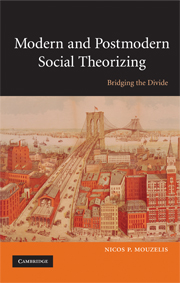Book contents
- Frontmatter
- Contents
- List of figures
- Acknowledgements
- Introduction
- Part I The theoretical background: the development of the agency–structure problematic
- Part II Parsonian and post-Parsonian developments
- Part III Agency and structure: reworking some basic conceptual tools
- Part IV Bridges between modern and late/postmodern theorizing
- 9 Modernity: a non-Eurocentric conceptualization
- 10 Ethical relativism: between scientism and cultural relativism
- 11 Cognitive relativism: between positivistic and relativistic thinking in the social sciences
- 12 Social causation: between social constructionism and critical realism
- Part V Towards a non-essentialist holism
- Instead of Conclusion: Twelve rules for the construction of an open-ended holistic paradigm
- Appendix: In defence of ‘grand’ historical sociology
- References
- Index
11 - Cognitive relativism: between positivistic and relativistic thinking in the social sciences
Published online by Cambridge University Press: 05 June 2012
- Frontmatter
- Contents
- List of figures
- Acknowledgements
- Introduction
- Part I The theoretical background: the development of the agency–structure problematic
- Part II Parsonian and post-Parsonian developments
- Part III Agency and structure: reworking some basic conceptual tools
- Part IV Bridges between modern and late/postmodern theorizing
- 9 Modernity: a non-Eurocentric conceptualization
- 10 Ethical relativism: between scientism and cultural relativism
- 11 Cognitive relativism: between positivistic and relativistic thinking in the social sciences
- 12 Social causation: between social constructionism and critical realism
- Part V Towards a non-essentialist holism
- Instead of Conclusion: Twelve rules for the construction of an open-ended holistic paradigm
- Appendix: In defence of ‘grand’ historical sociology
- References
- Index
Summary
Some of the issues raised by the postmodern, anti-positivist critique of the notion of objectivity are not new. The problem, for instance, of the influence exerted by the researcher's values and/or conceptual tools on a theory's empirical findings has a long history, and has been tackled, quite adequately I think, by such scholars as Weber and Elias (Weber, 1925/1978: 24–36, 285ff; Hekman, 1983; Elias, 1987a). Other problems, however, to the extent that they are part of the postmodern emphasis on the symbolic construction of all social phenomena, while not entirely new, raise new issues regarding relativism, and therefore deserve more extensive treatment. I begin with a brief reference to the more conventional questioning of the notion of objectivity.
Objectivity and the issue of mediation
Postmodern theorists reject the idea of objectivity and ‘value neutrality’ as it is formulated in positivist accounts of the social sciences. They reject the notion that social researchers can orient themselves to their field of study in a value-neutral, detached manner. They argue that it is not only values (political, ethical and aesthetic), but also the vocabularies used (lay or specialized) that mediate between the researcher and the research object. Therefore researchers with different values, different lay idioms and different specialized conceptual tools must inevitably end up with different interpretations and explanations of the phenomena they study.
- Type
- Chapter
- Information
- Modern and Postmodern Social TheorizingBridging the Divide, pp. 175 - 190Publisher: Cambridge University PressPrint publication year: 2008



